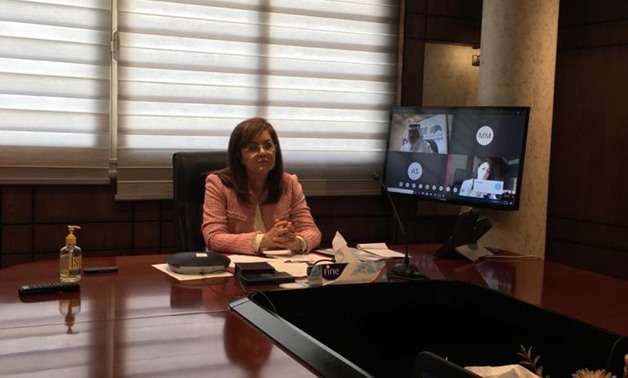
During the meeting - Press photo
CAIRO – 30 April 2020: Egypt is expected to record a growth rate of 4 percent by end of fiscal year 2019/2020 despite COVID-19 crisis, Minister of Planning Hala el-Saeed said Thursday.
Saeed pointed out that the crisis came at a time when the Egyptian economy is witnessing a remarkable boom in various indicators, in light of the serious reforms undertaken by the Egyptian state in the past five years, which started with the Egyptian economy achieving an upward growth rate of about 5.6 percent in the first half of 2019/2020, which is the highest rate of growth achieved in more than 11 years.
This came during the minister’s meeting with Minister of International Cooperation Rania Al-Mashat and President of the Islamic Development Bank Bandar Hajjar, via video conference. The meeting discussed the mechanisms of cooperation between the Egyptian government and the Islamic Development Bank in facing the economic and social effects caused by Corona virus, and to support the private sector.
The minister pointed out that the Egyptian state moved quickly to face coronavirus crisis and its repercussions, by taking many financial and monetary measures, explaining that these measures were characterized by a great degree of inclusiveness. For example, they included the allocations of the comprehensive plan to deal with the crisis, which is estimated at LE 1 billion, and providing support to the affected sectors, the most important of which are: the health, tourism and industry sectors, in addition to revitalizing the Egyptian Stock Exchange, and supporting regular and irregular employment.
She said that it is important for Egypt to benefit from all the assistance provided by the Islamic Development Bank, especially the private sector that was severely affected, stressing the state’s keenness to provide it with all support from financial policies or delay in taxes or insurance premiums, pointing to the cabinet’s decision to postpone all Sovereign receivables of sectors affected for a period of 3 months are renewed.
Saeed explained that Egypt is working to have a balance between maintaining health procedures and at the same time returning again to work, taking into account precautionary measures.
For his part, President of the Islamic Development Bank Bandar Hajjar affirmed the bank’s readiness to support the private sector in Egypt through its three institutions, namely the Islamic Corporation for the Development of the Private Sector, the International Islamic Corporation for Trade Finance and the Islamic Corporation for Insurance of Investment and Export Credit, noting that the bank is moving rapidly to support its member states, and also ready to provide technical support.
Hajjar said that the Islamic Development Bank has several short-term and long-term plans to support member states and mitigate them from the negative economic effects of the corona virus, and there is coordination with the G20.
The Islamic Development Bank announced earlier the allocation of about $2.3 billion to member countries to confront the coronavirus. Moreover, there is a framework for strategic partnership signed between Egypt and the Islamic Development Bank until 2021 with a value of $3 billion, which aims to align between the strategic plans of the Egyptian government and its development priorities in accordance with the 2030 sustainable development strategy, where the signed strategy focuses on four main axes, namely, raising the efficiency of production elements with high added value, enhancing their sustainability, economic and environmental quality, and reducing regional disparities and Economic exclusion by addressing rural poverty by building basic infrastructure and increasing farmers ’productivity, by supporting integrated rural development projects, trade finance development and financing, and supporting and developing the private sector, through trade financing and promotion, investment and export insurance, and financing for small and medium-sized companies, and capacity development through programs for exchange of knowledge and experience, effective cooperation and strengthening Islamic finance services.

Comments
Leave a Comment